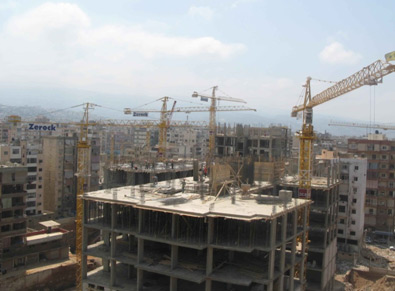|
|
To overview the “Waad” project (Waad is Arabic
for “Promise”) for reconstruction of the
Southern Suburb, which is one of the three
projects Jihad Reconstruction Association held
after the Israeli Aggression of 2006, a brief
introduction of the circumstances that imposed
this project is needed. The Reconstruction
project was not but a reaction to the planned
destruction of Lebanon from The July Aggression
of 2006, that Maadani claimed was the labour of
a New Middle East.
It is the essence of life that remains dominant
in the soul of the righteous people. It is the
vigorous spirit of our right of life, of
development, of progression. We rise from the
ashes of ruin to rebuild. We are resurrected
from the core of martyrdom to fight. We leap
from the grasps of death to live. Whether the
foe apprehends or not, it is his dilemma, for he
well knows that his wars, bombings, and crimes
will all vanquish at the feet of the Resistance.
We are the people who rise from the ashes to
live in the soul, body, and nation.

On the 14th of August 2006, Lebanon filled its
lungs with the fresh breath of dear victory,
scented with the aroma of martyrdom. The foe
shan’t accomplish its goals; our victory was
adorned with the Jihad and sacrifices of the
noble resisters and loyal Lebanese, the
martyrdom sloshed with the blood of more than
1200 martyrs of resisters, men, women, and
children civilians, the agony of thousands of
injured, and the bitterness of thousands of
families that lost sanctuary and home.
Yes, Lebanon was overwhelmed with suffering, yet
its people, as their perseverance, rose from the
ashes, and challenged all predicaments by
returning to their homes. They need not wait the
obstacles to be removed from the roads; they
drove behind each other in a long queue, taking
paths and roads they memorized by heart, and
drove around the fields of death the enemy left
behind in hope of harvesting more lives before
the flowers of return bloom.
The hasty return of the people who migrated from
the South, Bekaa’, Beirut, and the South
Suburban broke the last wave of aggression. The
act of a spontaneous popular resistance and a
clear and obvious reaction to the planned and
deliberate destruction the enemy resorted to
aimed at breaking the sacred bond between the
Resistance and its people.
This return was also a leap of faith in the
Resistance’s righteousness and cause, despite
the absence of any vision or clear plan from the
Lebanese government at the time to firstly
remove the ruin and secondly reconstruct. |